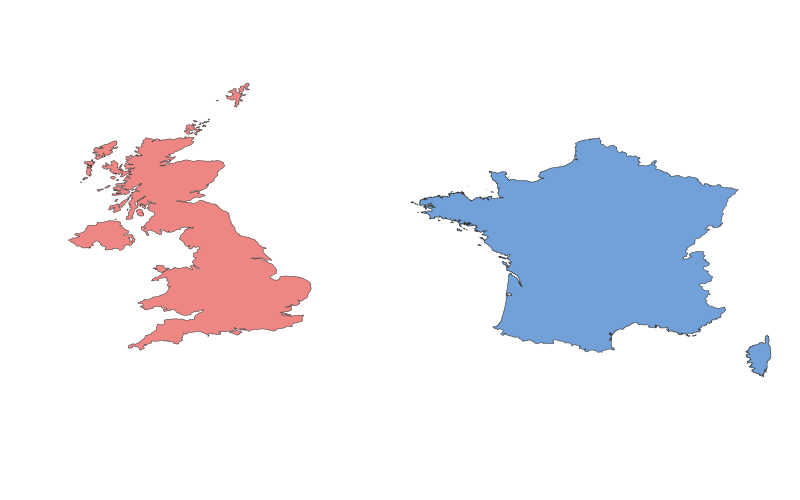United Kingdom vs. France: A Geographical Comparison

Comparison Table
| Category | United Kingdom | France |
|---|---|---|
| Location | Northwestern Europe, surrounded by the Atlantic Ocean, North Sea, Irish Sea, and English Channel | Western Europe, bordered by Belgium, Luxembourg, Germany, Switzerland, Italy, Spain, Andorra, Monaco, and the Mediterranean Sea, Atlantic Ocean, and English Channel |
| Size | 242,495 km² | 643,801 km² (including overseas territories) |
| Climate | Temperate maritime, with mild winters and cool summers | Varied: oceanic in the north, Mediterranean in the south, continental in the east |
| Natural Resources | Coal, petroleum, natural gas, iron ore, lead, zinc, gold, tin, limestone, salt, arable land | Coal, iron ore, bauxite, zinc, uranium, potash, fish, timber, arable land |
| Urban Development | Highly urbanized, with major cities like London, Manchester, Birmingham | Balanced urban-rural mix, with Paris, Lyon, Marseille as key cities |
| Transportation | Extensive road and rail networks; major airports like Heathrow and Gatwick | High-speed TGV trains; extensive motorway system; major airports like Charles de Gaulle |
Description
United Kingdom
The United Kingdom (UK), comprising England, Scotland, Wales, and Northern Ireland, is an island nation with a rich maritime history. Its temperate climate and fertile land have supported agriculture and industry for centuries. The UK played a pivotal role in the Industrial Revolution, shaping its modern economy around finance, technology, and services. Culturally, the UK is known for its literature, music, and historic landmarks like Stonehenge and Buckingham Palace. London, its capital, is a global financial hub.
France
France, the largest country in the EU by land area, boasts diverse landscapes from the Alps to the Mediterranean coast. Its history spans Roman conquests, the Renaissance, and the French Revolution, which influenced global democracy. France is a cultural powerhouse, renowned for its art, cuisine, and fashion. Paris, the "City of Light," is home to iconic sites like the Eiffel Tower and Louvre. Economically, France excels in aerospace, agriculture, and luxury goods, with a strong emphasis on nuclear energy.
Both nations are key players in Europe, with distinct geographical and cultural identities shaping their global influence.